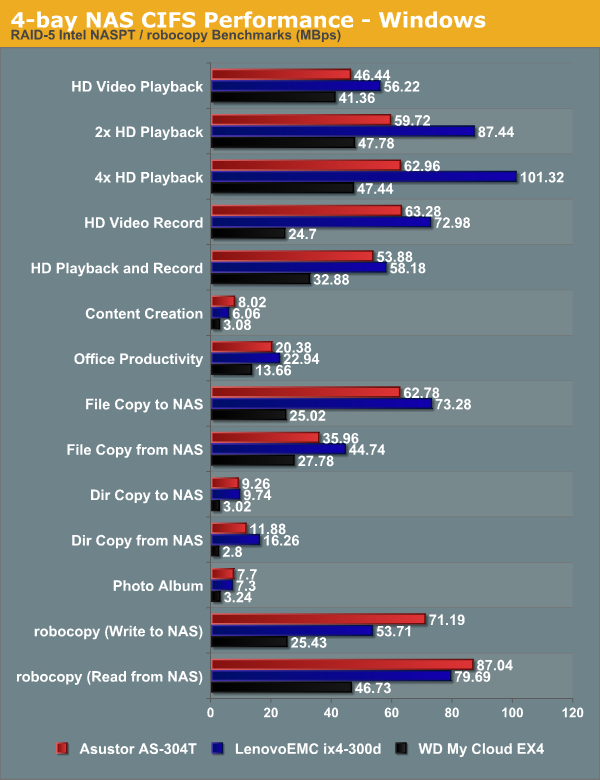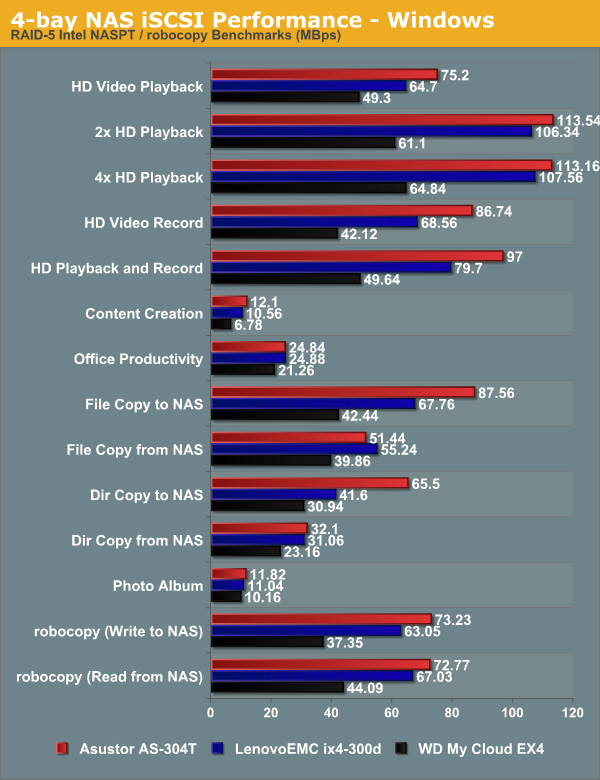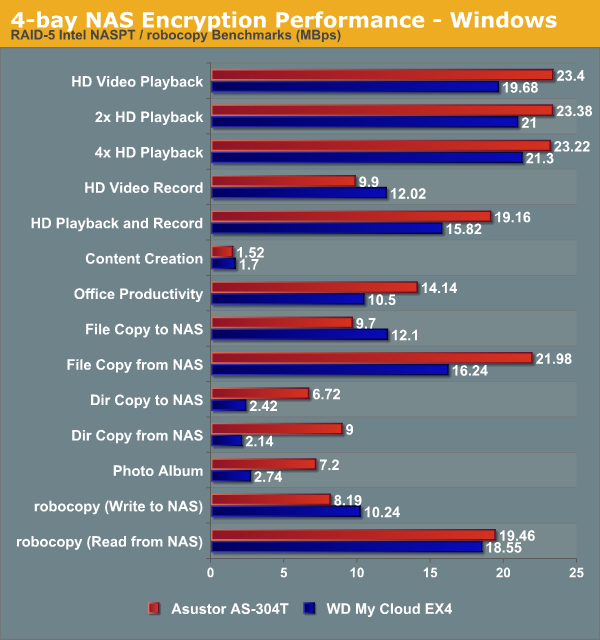Asustor AS-304T: 4-Bay Intel Evansport NAS Review
by Ganesh T S on March 26, 2014 11:15 AM ESTSingle Client Performance - CIFS & iSCSI On Windows
The single client CIFS performance of the Asustor AS-304T was evaluated on the Windows platforms using Intel NASPT and our standard robocopy benchmark. This was run from one of the virtual machines in our NAS testbed. All data for the robocopy benchmark on the client side was put in a RAM disk (created using OSFMount) to ensure that the client's storage system shortcomings wouldn't affect the benchmark results. It must be noted that all the shares / iSCSI LUNs are created in a RAID-5 volume.

The above numbers present some interesting results. The ARMADA XP-based ix4-300d manages to beat the AS-304T in multiple workloads. Based on the above graph alone, it might appear as if the ix4-300d is much better, but the AS-304T manages to take the lead in certain common workloads as well as feature set (hot-swap capability, for instance).
We created a 250 GB iSCSI target and mapped it on the Windows VM. The same benchmarks were run and the results are presented below. The x86-based AS-304T handily beats the other 4-bay NAS units that we have evaluated (all of which are ARM-based).

Encryption Support Evaluation
Consumers looking for encryption capabilities can opt to encrypt a iSCSI share with TrueCrypt or some in-built encryption mechanism in the client OS. However, if requirements dictate that the data must be shared across multiple users / computers, relying on encryption in the NAS is the best way to move forward. Most NAS vendors use the industry-standard 256-bit AES encryption algorithm. One approach is to encrypt only a particular shared folder while the other approach is to encrypt the full volume. Asustor supports only folder-level encryption in ADM.
On the hardware side, encryption support can be in the form of specialized hardware blocks in the SoC (common in ARM / PowerPC based NAS units). In x86-based systems, accelerated encryption support is dependent on whether the AES-NI instruction is available on the host CPU. The Atom CPU in the Evansport SoC doesn't support AES-NI, but the SoC does have a security engine. Unfortunately, Asustor's firmware doesn't take advantage of the security engine's APIs. The encryption is done using the host CPU and the performance is hit heavily. We enabled encryption on a a CIFS share to repeat our Intel NASPT / robocopy benchmarks. The results are presented in the graph below

Enabling encryption pulls down the performance numbers, most times by more than 50%. In terms of raw numbers, the performance is sometimes even worse than what can be obtained from ARM-based 4-bay units. If encryption is important, it might be better to wait for the next generation of Atom-based NAS units (the new Atom CPUs have AES-NI) or opt for a higher-end unit sporting a CPU with AES-NI capabilities.










34 Comments
View All Comments
bernstein - Wednesday, March 26, 2014 - link
Does this NAS finally have ECC?? (like for instance an ECC enabled ZFS linux fileserver)do people actually know how many digital photos get corrupted in 20years of not using ECC?
protomech - Wednesday, March 26, 2014 - link
No. How many digital photos are corrupted due to lack of ECC?I assume you're talking about ECC on the storage pools, not ECC in the computer main memory..
manmax - Wednesday, March 26, 2014 - link
He mentions ZFS so I guess he means the data integrity checking and self-healing of corrupted data features of ZFS and Btrfs. This is probably my main reason to go with ZFS or Btrfs for NAS devices especially when used for backup purposes.Overtime, bits can just randomly flip on a hard drive (the drive is still perfectly fine). For example, old photos, music and videos all of sudden don't open or are distorted. RAID (at least most implementations I've seen) doesn't save you from random bit flipping. It's mainly for keeping a server up if a drive completely fails, not from file corruption.
Gigaplex - Saturday, March 29, 2014 - link
I've had file system corruption because a stick of RAM went bad, affecting the file system cache. My next build will have ECC RAM.hoboville - Thursday, March 27, 2014 - link
Without ECC, a scrub of a ZFS pool can corrupt your entire dataset. It happens, a lot. Regardless, ZFS provides better features like ARC, and full CoW. Ext4 RAID would be viable too, but for an average home user, ZFS is going to be too much because it has higher hardware requirements, requires a more advanced user, and will generally cost more money. Like Ganesh said, these cheapo units are good for simple HTPC stuff.Oyster - Wednesday, March 26, 2014 - link
Good work, Ganesh. Thanks for incorporating our feedback and including competitor benchmarks as standalone performance graphs.ganeshts - Wednesday, March 26, 2014 - link
Thanks! The suggestion made sense, but we were waiting till we got enough units reviewed with the new methodology in each category (splitting by number of bays)Flunk - Wednesday, March 26, 2014 - link
Is Asustor in any way related to ASUS?ganeshts - Wednesday, March 26, 2014 - link
Yes, they are a subsidiary of AsusDirector12 - Wednesday, March 26, 2014 - link
How does it stack against the Asustor 604T?